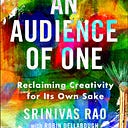Member-only story
What it Means to be Black in America
Color is a fact. Race is a social construct. — Isabel Wilkerson
In 1978, my father left India to pursue a Ph.D. in Australia. When I got older, he told me a story about trying to help a black colleague find a place to live.
Multiple landlords refused to rent to my dad’s colleague based on the color of his skin. After that my dad would call the landlords and say “my friend is black and we would prefer not to drive there if you’re not going to rent to him.”
Growing up in a small Texas town, I was often shocked by the blatant racism towards black people. When I was in 9th grade, two black students got into a fight. One stabbed the other with a knife, and the one who got stabbed died a few hours later. All of us were sent home from school that day.
The friend whose mother picked us up from school said to him “now that that n@#@#@r got stabbed, you can go get your hair cut.” Then she drove us to the country club, where a black waiter served us lunch. It’s hard to forget moments like that.
What strikes me most about that experience however is that my friend’s parents were…
